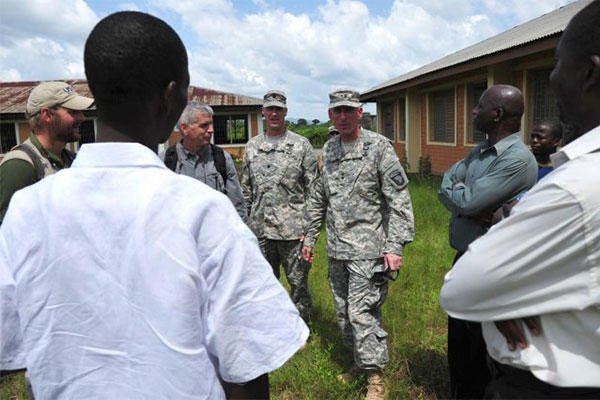FORT CAMPBELL -- Troops returning from West Africa on emergency leave will be allowed to skip medical isolation on a case-by-case basis, Maj. Gen. Gary Volesky, commander of the 101st Airborne Division, told reporters here Thursday.
"We do a risk assessment of every soldier, the approval authority for any soldier to leave theater is held at the Joint Forces headquarters," Volesky said during a video teleconference from Liberia. "If we look at that and say his risk or her risk is higher, we may say that have to through a controlled monitory."
Volesky spoke to reporters on the same day about 80 troops were scheduled to return home today from the Ebola mission to Joint Base Langley-Eustis, Virginia, to begin a 21-day quarantine during which they will be monitored for the disease. Those troops were part of the initial deployment to the region under U.S. Army Africa commander Maj. Gen. Darryl Williams.
So far three soldiers deployed under the Joint Force have been returned to the U.S. for emergency leave. All three were considered very low risk because they were in Liberia for no more than a week, he said. The soldiers are self-monitoring for the virus, which includes taking their own temperature and checking in with their chain of command twice daily, he said.
"Our chain of command knows exactly who those soldiers are," he said. "We’re monitoring them and making sure that everything is fine with them."
"No soldier has been exposed to any Ebola virus, no soldier has been in the presence of any infected person who has Ebola," he said.
Check out details of the Ebola treatment unit concept plan.
The Operation United Assistance Joint Force, made up of elements of the 101st Airborne, deployed to Liberia in mid-October to support USAID personnel in building Ebola treatment units and training health-care workers.
Langley-Eustis is one of five stateside bases where returning troops will undergo the controlled monitoring. The others are Joint Base Lewis-McChord, Washington, Fort Bliss and Fort Hood, Texas and Fort Bragg, North Carolina.
Despite the fact that about one-third of the 3,000 troops projected to deploy to West Africa are based at Fort Campbell, this base was not included as an isolation location because it lacks the capacity to house a large number of troops in an isolation setting, Volesky said.
Over the month they have been in country, troops from the 101st have constructed and opened several treatment facilities, including a 240-bed location designed specifically to treat infected health care workers, Volesky said. Two workers have been admitted since its initial opening last week.
Troops are also training 200-300 healthcare workers per week, he said.
The so-called Ebola Czar, Ron Klain, responded to the news that the Defense Department would reduce the number of troops needed for the West Africa Ebola mission from 4,000 to 3,000. He said much more needs to be done despite the signs of progress in West Africa and the U.S.
"We are not at the beginning of the end or even the end of the beginning, but we are at the throes of this effort in West Africa with interventions that can work," Klain





























